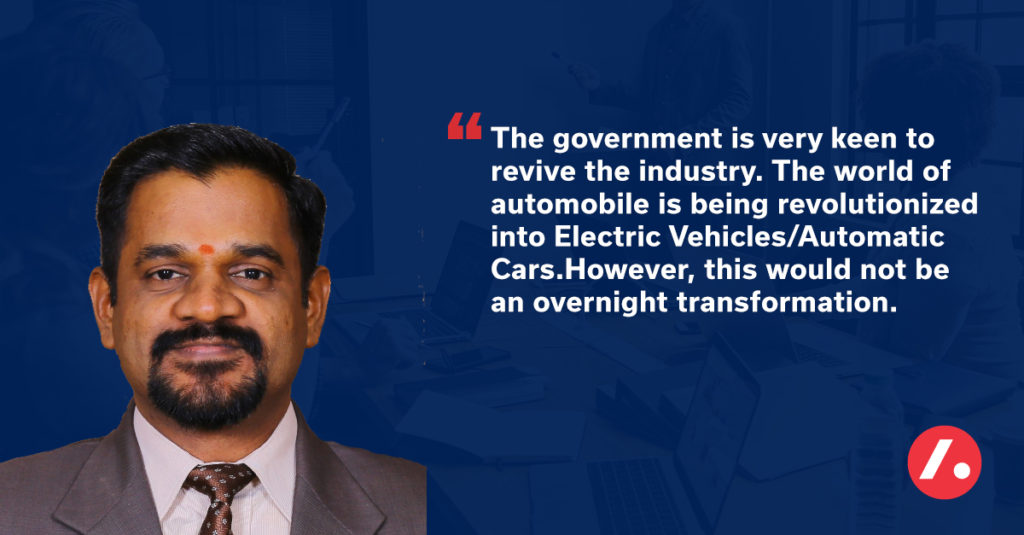
The Indian Auto Industry Struggles Again!
Our Vice President, Mr. Nagarajan C. gives an insight for what is in store for the automobile industry in the year 2020!
The Indian auto industry has experienced a lot of ups and downs over the years. As a result, the supply and demand for talent among auto workers has fluctuated significantly. Here’s what’s happened, what’s happening now, and what we think will happen to the industry in the future – automobile industry analysis
A Brief History
In 1995, Ford established its first manufacturing unit in Chennai. Soon thereafter, other auto brands such as BMW, Daimler, Hyundai, Mitsubishi, Nissan, Renault, and Yamaha began to follow suit. With so many manufacturing plants popping up in the region, Chennai had become a world-class ecosystem for the automotive sector.
Then, in 2008, India was hit hard by the economic downturn of the Great Recession. As the demand for vehicles declined, productivity slowed, jobs were cut, and the industry suffered.
Soon, global rivals such as Chrysler, GM, and Toyota began to creep into the Indian consumer market, setting the stage for fierce competition among automakers in a depressed market. Where some flourished, others floundered; only the strongest survived.
As automakers competed for their share of the market, job opportunities went up. The demand for auto industry talent in India tripled, and auto companies began to poach talent from the same limited talent pool.
Falling on Hard Times
Today, Tamil Nadu is a top-10 hub of auto manufacturing activity as Chennai has the capacity to manufacture approximately 1.4 million cars every year. While many auto brands are responsible for this good reputation, the region owes much if its success to domestic auto manufacturers such as Ashok Leyland, Royal Enfield, TAFE, and TVS Motor Co.
Despite this regional success, however, the Indian auto industry is beginning to experience the same turmoil from 2008; auto manufacturers are (once again) limiting production and laying off workers. According to PTI, several Indian automobile and auto component manufacturers have implemented “non-working days”—which have grown from 8 to 14 per month—or have shut down completely. The sector’s 3.5 crore of jobs are now at risk.
In July 2019, domestic vehicle sales hit an all-time low, sinking approximately 30% in one year. And according to CMIE (a private data group), the unemployment ration in the sector rose from 5.6% to 7.5%.
Sources have also confirmed that 3.5 lakhs of automobile workers in India have been laid off since the beginning of FY 2019 – 20. This is regarded as the fourth largest layoff in the automobile manufacturing sector worldwide.
Does History Repeat Itself?
In the pre-2009 era, the automotive industry’s growing ratio of supply and demand was uprooted by the global recession.
In 2000, the automobile consumer market became flooded with global brands, offering a variety of options that led to the rise of some automakers and the fall of others.
Today, auto industry associations such as SIAM, ACMA, and the Federation of Automobile Dealers Association are requesting that the government reduce its GST (Goods and Services Tax) from 28 to 18%. While the industry slowdown is to blame for such a request, it remains unclear whether it will impact tax revenue collection.
Will government authorities and industrial bodies make bold decisions like they did in 2009?
Can the industry attract foreign investments to get the Indian auto industry back on track?
Possible Cure?
The government is very keen to revive the industry. The world of automobile is being revolutionized into Electric Vehicles/ Automatic Cars. However, this would not be an overnight transformation as the top auto manufacturers like Toyota, Honda, Suzuki, MG Hector and Mahindra have already introduced their Hybrid models in the market but still, challenges being remained are:
- Charging Infrastructure – India is still in a very nascent stage for electric vehicles
- Cost of Battery Packs – The cost of EVs is very high due to the Li-ion cells being imported, about $275/KWh coupled with 28% GST and lack of lithium in India
- Lack of renewable energy resources – With an introduction of EVs, the demand of electricity will go soaring high and this nullifies the whole point of introducing EVs, if all this electricity is produced by coal
The year 2020 would be surely be reformation year for the industry, mainly in car manufacturing segments, the two-wheeler manufacturing would not be a challenge as relatively smaller automotive manufacturers might step forward hence, this will lead to the job creations.
I invite you to connect with me:
Vice President Operations, Acara Solutions India, Chennai
Email: nagarajanc@acarasolutions.in




